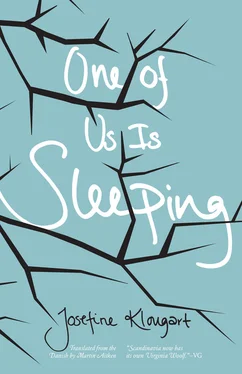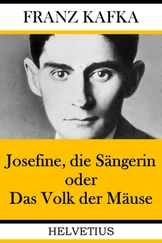When what feels necessary isn’t necessarily valid . Where, then, to deposit oneself but in a body deceitful.
She slept badly. It was like that.
That feeling that made her laugh when the blind fell down, when she took on the apartment; that same feeling came back to her when again she could not sleep.
The fatality of time and again believing the world is determined by something. Something outside of itself. Or just determined , in whatever way at all. Timing. Believing you can see patterns in the world is the same as imagining you can reach out of a window, hold out your hand, and wait a couple of seconds until a leaf, a feeble, tattered leaf, settles there gently, surely in your palm. The same as expecting you can fall asleep, in such a world.
And yet it happens all the time: people fall asleep. You see connections. Or you think you see connections; and for a moment you might feel you belong.
That something like a home exists.
Only it’s not as simple as that; there are moments of collapse, life consists of little else.
A face brought down, revealed to be one’s own.
Sensing how the sand on the beach in front of the hotel at Svinkløv is retrieved by the sea as each wave retreats. The current they warn you against, and which the body recognizes before the mind; an urge to succumb.
And that would be it.
What such an urge might mean.
She misses having a home, it’s a condition.
Eventually she falls asleep and dreams about a man who says in English: My hands are dirty, you don’t want to meet me .
The world laughing in your face like that. The writing laughs with it, that line of dialogue. It all gets entangled in the writing. What was, and what is, or perhaps may come. Sentences and lines of dialogue.
A desire to be older, revealing itself to be a desire not to lose one’s childhood. Not to lose anything, whatever it might be, to maintain a hold in the flow of all things, to stand firm there and preserve. In some form, to keep hold of it all, and not leave anything behind in that burning house. Wherever you go, you leave behind you a trail of disaster, no matter what the circumstance, that’s how it is. A trail of collapse, something falling outside of all recollection, all that is not remembered by anyone and is forgotten by the world. She is not quite sure, but the feeling grows stronger, she sees it in him: a kind of reverse will to live; a nostalgic reluctance toward surrendering oneself to the world that exists. That kind of panic in the tissue, a fear of forgetting. She writes so as not to forget things, or else she writes in order to forget things and invent other things more worthy of remembrance. Perhaps that’s what writing is: you start moving about in the world like a sleepwalker in the night, looking for something more real, a truth there; and then all of a sudden it’s sleep that you sacrifice, then suddenly the family, then everything that is valuable and means something. Dreams while awake, ideas, pulling everything with them like waves returning, returning to the sea, faces washed away, washed clean of all humanity. Or the opposite: invoking a humanity all too exaggerated: too much human in too small a space, that pealing reality when your entire being wants that someone else.
She thought the right thing to do was perhaps to find a life first, and only then look for a way of working that fit in with that life. That it should happen in that order, instead of carrying on the way things were; searching for a way of living that fit in with her work.
IT DOESN’T LOOK like him at all, and yet: it’s him, she knows it is. As full of life as a bonfire in spring, at the beginning of March, the same look on his face, no less: confident. They visit her parents, they are still going out, they walk in the hills and she cannot forget that he tells her about a girl he used to know. Every month she ran short of money. And then, he says, when the money ran out she collected her last coins, searching coat pockets and rummaging at the bottom of bags, and then she would go to the florist’s on Bruunsgade and buy flowers. Cut flowers. With the very last of her funds. How many lilies can I get for this, she would ask. How many daffodils for forty-two kroner.
He laughs, and is then silent again.
The sun beats down, she grabs at some foxtail and grass. That’s what I want, she thinks. To live alone in a city, with no money, and buy cut flowers. That kind of recklessness, that’s what I want.
He was too frail for this world; but it was she who was made to be the symbol; you are too frail for this world, he could say, drawing her toward him and hugging her. Or else in anger:
you’re never here .
You’re never here. Never present.
You could start to doubt which of them was never there: one of them, at least, always one of the two; somewhere else.
You’re always rushing about, it’s your family that put that into you, he says.
She looks up from a book. Yes, is all she says. You see, that’s exactly what I mean, he says, throwing his hands in the air, his face, like his shirt, at once open and more closed than ever before.
What do you mean.
You don’t hear anything, you’re somewhere else.
She puts the book down in her lap. I’m here, she whispers.
We live parallel lives, he says. Every morning you’re out running, we can’t even wake up together, we can’t even go to sleep together. We eat at different times, we live without each other.
She gives a shrug.
It’s not true, she could say. But it is, true, most of it, true and yet not the whole picture by any means.
You’ll run yourself into the ground like that; it’s hardly surprising you’re finding it hard to keep yourself together.
I’m depressed, she says. You said so yourself. You’re talking about what it’s like to live with someone depressive, aren’t you. It’s hardly surprising you’re falling apart, he says. That we are.
Nothing is allowed to dry, they are a wound continually reopened. It was always that, love is a wound. He sits down on the chair opposite, puts his bare feet on the coffee table between them.
And he was right, but it was quite as true, I think now, this winter, with the snow making everything stand out so clearly or disappear entirely; it was quite as true that you never felt the rush of being loved that I always felt. That feeling of something being important, absolutely necessary: red apples, their brightness, something lifting the day up above a simple matter of getting up or not getting up, the issue of e.g. the work ethic, something like: the doggedness of the work ethic. You always tried to convince me those things were destroying me. From within. You frightened me. But it wasn’t true, I can see that now, or not entirely . I believed in you, even if I suppose I knew different all along.
I knew something else was true as well.
It’s that too: the will of the flesh to be in motion, the work that despite everything kept me together. That gave my life the rhythm your body always lacked. A beat that enabled me to maintain a hold in the flow of all things. To press a paintbrush against the porcelain of the sink, to carefully spread its bristles between the fingers, to see the color wash away, thinner and thinner. To rinse the white sink clean, to dry the brushes. To crumple up a pile of newspaper and feel the stiffness it had gained from the acrylic paint that ran and then dried, sapless newspapers, wrinkled as old apples, a smell of fixative first discovered after having been outside and come in again. You’ve got paint on your cheek, you would say, and I was in something. You had your problems, I’m sure, clutching at you, that was when I realized; yet nothing that would prompt you out of bed in the morning, without lingering, without first wondering: why . If too much time passes between waking and getting up, I suppose that can be seen as a bad sign. Too many questions, if you start asking yourself; all that time. The whole notion of having to consider in that way — a sign of desperation.
Читать дальше












